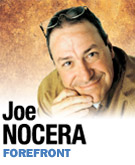Subscriber Benefit
As a subscriber you can listen to articles at work, in the car, or while you work out. Subscribe Now
 You have to love the fact that when John Yates resigned this month as assistant commissioner of Scotland Yard he complained about the “huge amount of inaccurate, ill-informed and, on occasion, downright malicious gossip” that had finally forced his hand.
You have to love the fact that when John Yates resigned this month as assistant commissioner of Scotland Yard he complained about the “huge amount of inaccurate, ill-informed and, on occasion, downright malicious gossip” that had finally forced his hand.
My first thought was: He didn’t really say that, did he?
When the writers and editors of the late, unlamented News of the World were busy bribing Yates’ police officers, what they wanted in return was—gosh!—malicious gossip. When they were hacking the phones of royal family members and murdered teenagers, they were seeking, you know, malicious gossip. When the recently arrested Rebekah Brooks called Gordon Brown, the former prime minister, to tell him that Rupert Murdoch’s Sun, which she then edited, was about to reveal that his infant child had cystic fibrosis—information that Brown is convinced came from a hacked phone message—she was telling him the paper was going to print a piece of gossip that a more humane institution would have let pass. She might not have viewed this as malicious, but the Brown family certainly did.
Let’s be honest here. There is something undeniably rich about seeing the tables turned like this. When I see photographs of Brooks, or Murdoch, or his son James (who until a few weeks ago, was his father’s heir apparent at News Corp.), sitting in their cars, staring blankly ahead, I can just picture the paparazzi horde jostling to get a decent shot of its prey. Murdoch’s papers have always feasted on scandals like this, picking the bones of its victims. Now Murdoch’s the one whose bones are being picked.
“The schadenfreude is so thick you can’t cut it with a chainsaw,” wrote The Wall Street Journal in an editorial, defending Rupert Murdoch and News Corp. (That’s right. After woefully undercovering the scandal in its news pages, The Journal’s editorial page is now leaping to the defense of its owner. Proving, yet again, that The Journal knows where its bread is buttered.)
Although I generally admire entrepreneurs who build giant companies, Rupert Murdoch, despite giving us Homer Simpson, generally has not been a force for good over the course of his long career. His Bill O’Reilly-ed, Glenn Beck-ed Fox News has done a great deal to coarsen the political discourse. His tabloids have lowered the standards of journalism on three continents—and routinely broken the law on at least one of them.
He had dumbed down his prestige papers, like The Times of London. He has run roughshod over cross-ownership rules meant to prevent one man or company from having too much power—and then used his lobbying might to get those rules diluted. He has put kowtowing to China ahead of freedom of the press, even killing a book set to be published by his HarperCollins unit that the Chinese authorities objected to. He has consistently used his media properties to reward allies and punish enemies. It’s a long list.
Throughout his career, Murdoch has never just been satisfied with besting the competition, as most decent businessmen are. He’s not truly happy unless he has his foot on a competitor’s neck and is pressing it downward. Felix Salmon, a blogger for Reuters, unearthed testimony about an executive who ran one of Murdoch’s more obscure divisions. “I will destroy you,” the man told a competitor, according to the testimony.
One feature of Murdoch’s career is that he’s never played by the rules that apply to other businessmen. That’s one reason I think he seems so shellshocked in those paparazzi photographs: unable in this dire circumstance to make his own rules, he simply doesn’t know how to react or what to do.
In the e-mails I trade back and forth with friends, we can’t stop marveling at the scandal, at the head-spinning twists and turns. “It’s the best kind of story,” one wrote me, “because none of us really knows how it ends.”•
__________
Nocera is a New York Times columnist. Send comments on this column to [email protected].
Please enable JavaScript to view this content.
